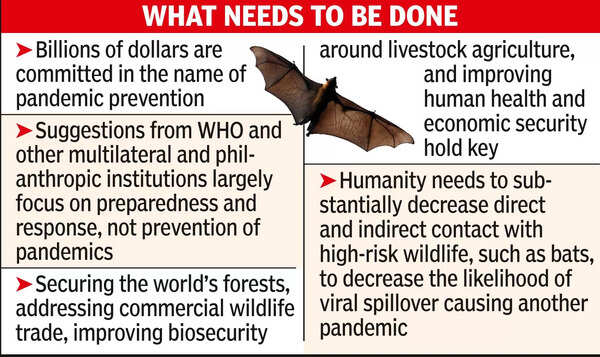- News
- City News
- nagpur News
- Leave bats alone, respect nature to prevent future pandemics: Study
Trending Topics
Leave bats alone, respect nature to prevent future pandemics: Study

Nagpur: A new research paper in the journal ‘Lancet Planetary Health’ makes the case that pandemic prevention requires a global taboo whereby humanity agrees to leave bats alone — to let them have the habitats they need, undisturbed.
“Humanity needs to urgently change its relationship with nature, specifically wildlife, and particularly bats. In a globalized world with 8 billion people, maintaining an aggressively exploitative relationship with nature is potentially societally suicidal,” the researchers from Cornell University and Wildlife Conservation Society (WCS) say.

According to the researchers, like the SARS coronavirus outbreak of 2003, the Covid-19 pandemic can be traced back to a bat virus. “Whether someone handled or ate an infected bat or was exposed to a bat’s bodily fluids in a cave or some other way, or was exposed to another animal that had been infected by a bat, we will quite likely never know. Even a virus released via a lab accident would still have originally come from a bat. But we don’t need to know all of the details in order to act,” the researchers say.
Bats are known to be reservoirs for a wide range of viruses that can infect other species, including people. They are a source of rabies, Marburg filoviruses, Hendra and Nipah paramyxoviruses, coronaviruses such as Middle East Respiratory Syndrome (MERS) coronavirus. Fruit bats are strongly believed to be a source of ebola viruses.
The analysis points to the value of a global taboo whereby humanity agrees to leave bats alone — not fear them or try to chase them away or cull them (activities that only serve to disperse them and increase the odds of zoonotic spillover) — but to let them have the habitats they need and live undisturbed.
The authors emphasize that humanity simply must take the most basic, common-sense upstream steps to lower our risk of incurring another pandemic — at the interface where dangerous viruses can actually move from animals into people.
“In a globalized world, we can no longer ignore our interconnectedness with the wildlife and ecosystems around us. We must change humanity’s relationship with nature if we want to prevent the next pandemic of zoonotic origin,” says Dr Susan Lieberman, WCS’s vice-president for international policy.
Steven A Osofsky, lead author of the study and professor of wildlife health & health policy, Cornell University, says “Getting humanity to work collaboratively at a global scale underpins most of the existential challenges we face, from climate change and environmental pollution to biodiversity loss and ecosystem collapse — this at a time when earnest collaboration even at local scales often seems elusive.”
The authors emphasize that allowing bats to survive and thrive will also pay billions of dollars in dividends in the form of the ecosystem services that bats provide, such as control of mosquitoes and other harmful insects, as well as pollination of a wide array of important crops.
They conclude that humanity’s relationships with other kinds of animals indeed merit close scrutiny, “but respecting bats and the habitats they need is truly the lowest hanging fruit of genuine upstream pandemic prevention — an important better-late-than-never message now that we’ve passed the third anniversary of the Covid-19 pandemic”.
“Humanity needs to urgently change its relationship with nature, specifically wildlife, and particularly bats. In a globalized world with 8 billion people, maintaining an aggressively exploitative relationship with nature is potentially societally suicidal,” the researchers from Cornell University and Wildlife Conservation Society (WCS) say.

According to the researchers, like the SARS coronavirus outbreak of 2003, the Covid-19 pandemic can be traced back to a bat virus. “Whether someone handled or ate an infected bat or was exposed to a bat’s bodily fluids in a cave or some other way, or was exposed to another animal that had been infected by a bat, we will quite likely never know. Even a virus released via a lab accident would still have originally come from a bat. But we don’t need to know all of the details in order to act,” the researchers say.
Bats are known to be reservoirs for a wide range of viruses that can infect other species, including people. They are a source of rabies, Marburg filoviruses, Hendra and Nipah paramyxoviruses, coronaviruses such as Middle East Respiratory Syndrome (MERS) coronavirus. Fruit bats are strongly believed to be a source of ebola viruses.
The analysis points to the value of a global taboo whereby humanity agrees to leave bats alone — not fear them or try to chase them away or cull them (activities that only serve to disperse them and increase the odds of zoonotic spillover) — but to let them have the habitats they need and live undisturbed.
The authors emphasize that humanity simply must take the most basic, common-sense upstream steps to lower our risk of incurring another pandemic — at the interface where dangerous viruses can actually move from animals into people.
“In a globalized world, we can no longer ignore our interconnectedness with the wildlife and ecosystems around us. We must change humanity’s relationship with nature if we want to prevent the next pandemic of zoonotic origin,” says Dr Susan Lieberman, WCS’s vice-president for international policy.
Steven A Osofsky, lead author of the study and professor of wildlife health & health policy, Cornell University, says “Getting humanity to work collaboratively at a global scale underpins most of the existential challenges we face, from climate change and environmental pollution to biodiversity loss and ecosystem collapse — this at a time when earnest collaboration even at local scales often seems elusive.”
The authors emphasize that allowing bats to survive and thrive will also pay billions of dollars in dividends in the form of the ecosystem services that bats provide, such as control of mosquitoes and other harmful insects, as well as pollination of a wide array of important crops.
They conclude that humanity’s relationships with other kinds of animals indeed merit close scrutiny, “but respecting bats and the habitats they need is truly the lowest hanging fruit of genuine upstream pandemic prevention — an important better-late-than-never message now that we’ve passed the third anniversary of the Covid-19 pandemic”.
Start a Conversation
FOLLOW US ON SOCIAL MEDIA
FacebookTwitterInstagramKOO APPYOUTUBE










